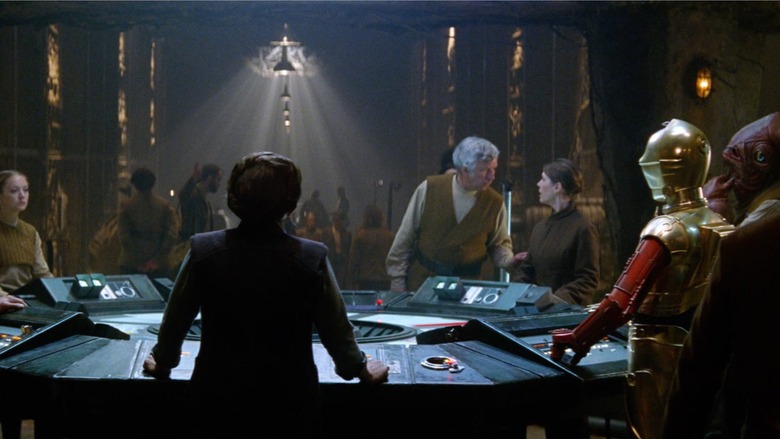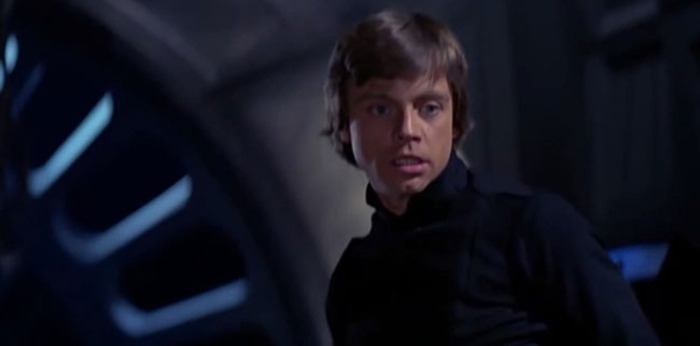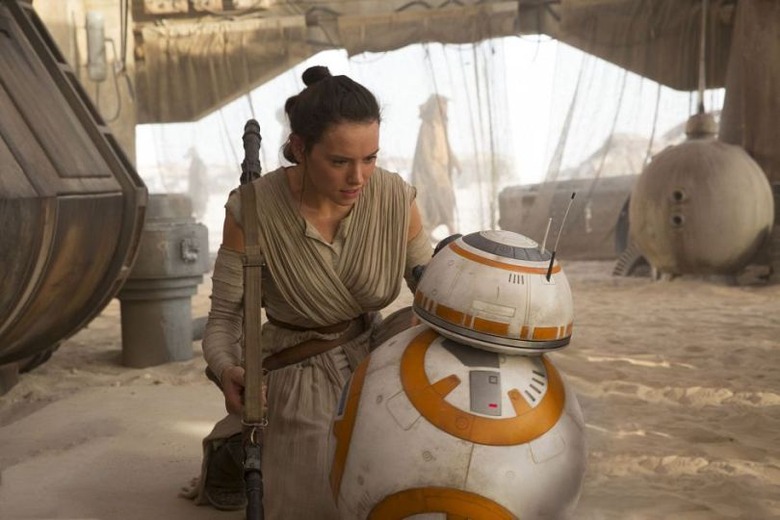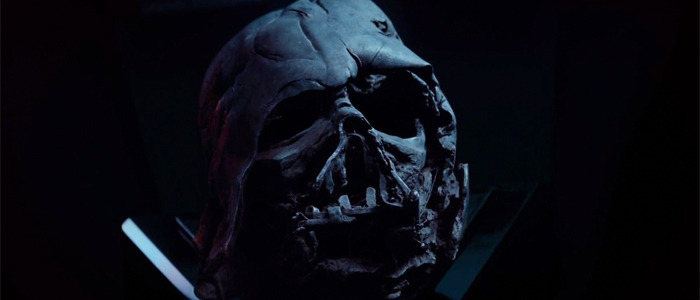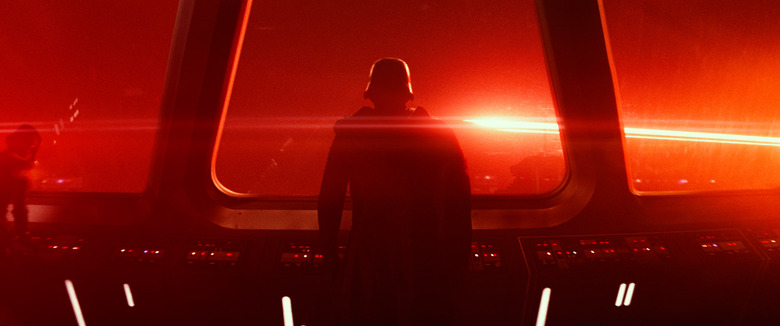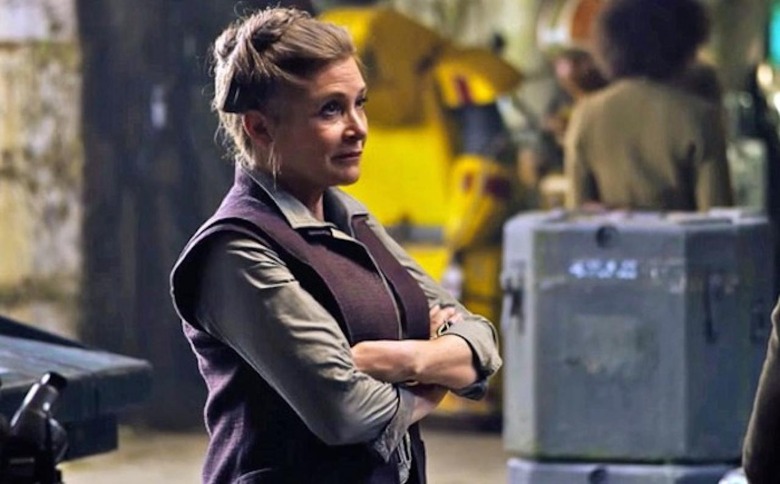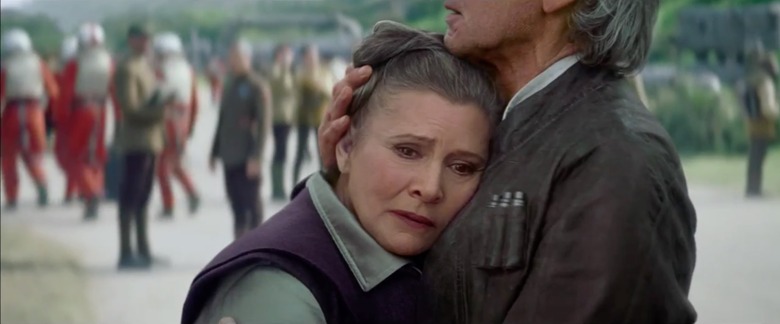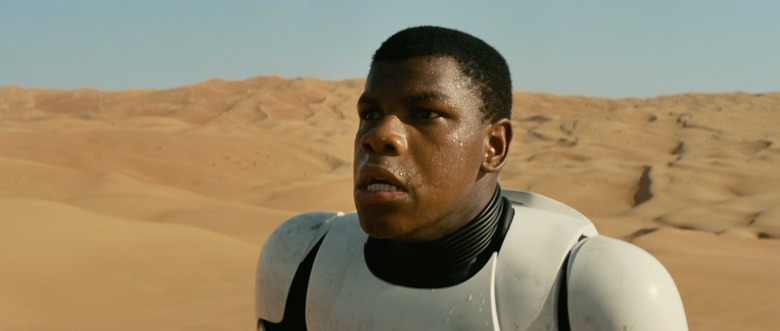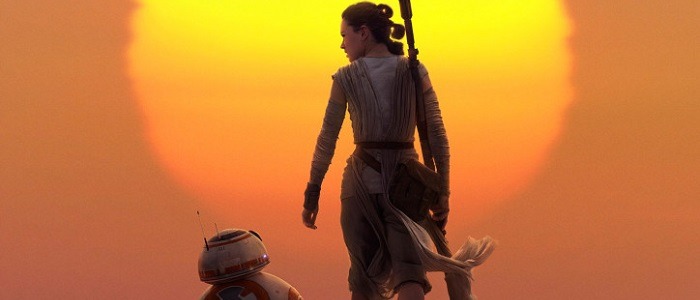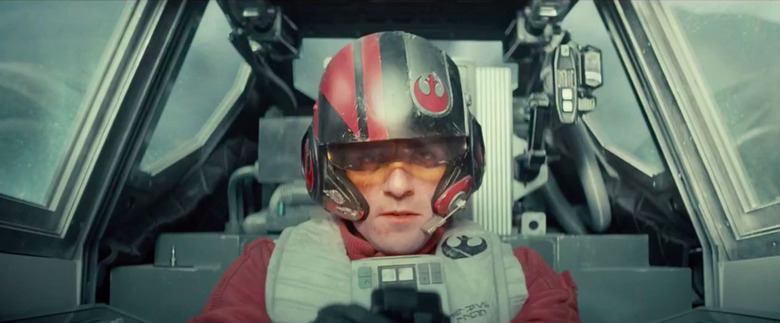10 Insights From The 'Star Wars: The Force Awakens' Novelization Not In The Movie
A few days ago, we took a deep dive into the unanswered questions of Star Wars: The Force Awakens. And let's face it: like it or not, the latest episode in the Star Wars saga has a lot of questions in desperate need of answers. Some of them feel like deliberate mysteries that will be addressed in future films. Others feel like the result of a few difficult editing decisions, where details were shed to keep the momentum of the film rolling at all costs.
So now, you have two options going forward. You can patiently sit around and twiddle your thumbs and wonder what Rian Johnson will reveal in Star Wars: Episode 8...or you can dive into all of the canon novels that may provide you with the answers you're looking for.
The internet has already taken a deep dive into the Star Wars: The Force Awakens novelization by legendary genre writer Alan Dean Foster, who has written his fair share of Star Wars books (including the original novelization of the original 1977 movie). As expected, the book is filled with additional information at the state of the universe and the characters inhabiting it. Some of these details add fascinating color to the story. Others feel like deleted scenes that will eventually show up on a future Blu-ray and DVD. A few bits here and there feel like necessary information that should have been included in the final film.
So how about we sort through it and see what we find?
The folks over at Star Wars News Net have assembled a long (and spoiler-filled) examination of Foster's novelization. If their post is any indication, many of the rough edges in the final film are smoothed over in the book, which will certainly give Star Wars obsessives a reason to slow their breathing just a little. If you want to take a deep dive into what separates the finished film from its novelization, you should click that link. We're going to hit up a few of the highlights.
What Is Up With The New Republic?
First up, the novelization addresses one of the film's biggest narrative question marks head on – what, exactly, is up with the New Republic and why does it matter that the First Order wipes them off the map? It turns out that governing body of the known galaxy had a large, battle-ready fleet that was also turned to space dust along with all of the politicians. This the First Order is now the biggest military power in the universe and the scrappy Resistance is all that stands in its way. Sound familiar? Details:
It is also mentioned that the Republic has a substantial fleet that is wiped out when the First Order detonate the Starkiller and wipe out the Hosnian system. This was another point I thought was not underscored enough in The Force Awakens. Whatever Republic was being rebuilt over the last few decades since shortly after Return of the Jedi, is now dust, for the most part. Something mentioned by Leia shortly after the detonation of Starkiller; the Resistance and the First Order are all that remain in terms of military powers, and that if there is a conflict between them, the Resistance is not strong enough to defeat the First Order without the Republic's fleet.
Why Is Snoke Afraid Of Luke Skywalker?
The novelization also reveals more about Supreme Leader Snoke (Andy Serkis), the mysterious, scarred mastermind behind the First Order whose role in the finished film is a little baffling. It turns out this all-powerful menace, a guy capable of raising a gigantic army, turning a planet into a weapon, and turning Ben Solo against his parents, is very afraid of someone we know and love:
One thing is much clearer in the book than the film: Snoke is afraid of Luke Skywalker. In his final conversation with Kylo Ren, before Rey escapes, Snoke is prepared to destroy an entire system so no one finds where Luke is, himself included. Destroying the Resistance is Hux's motivation, but he is practical, seeing that the system has vital resources the First Order could use. Snoke will have none of it. Destroy the system so that no one can ever find Luke Skywalker. It may appear bold and sadistic in the film, but in the novel, it reads as desperate. Snoke constantly speaks to either destroying Luke via Kylo Ren or the First Order's military, or making sure Luke stays where he is.
Who Are Rey's Parents?
The internet instantly erupted into fan theories the moment the credits rolled on the first screenings of The Force Awakens, but the most ardent discussions have revolved around the unknown parentage of Daisy Ridley's Rey. While Foster's novelization doesn't solve the mystery, it does offer up a few extra hints. Unless the folks behind the saga are throwing us a wild curveball, it's starting to look like this hyper-competent desert scavenger is definitely a long-lost Skywalker, possibly even the daughter of Luke. There is an additional line of Kylo Ren dialogue, delivered after his failed attempt to probe Rey's mind, that suggests such:
The biggest hints at Rey's Skywalker lineage are from Kylo Ren's perceptions of Rey. Just like the film, Kylo is noticeably shaken when, in addition to his inability to probe Rey's mind as much as he would like, she can get inside of his. My, and many fans reading, will probably note another line of dialogue in the novelization that was absent from the film. It's the moment when Kylo Ren calls Luke's lightsaber to him and it flies right past him and into Rey's hands. In the novelization, Kylo says to himself, "It is you". To me, this says Kylo knew Rey or a direct descendant of Luke Skywalker was out there. Perhaps it was the one thing he kept from Snoke, whether that was Ben Solo keeping it from Snoke or Kylo, it seems Rey's ability in the Force makes something CLICK in Kylo Ren's head. Again, nothing solid, but much more brow raising when you read it in print. I won't hypothesize the why or how Kylo may know, but I think this strongly suggests he does, and that is another reason the line was eventually cut from the film.
Darth Vader's Redemption Is Dismissed
Meanwhile, over in that wretched hive of scum and villainy known as Reddit, fans starting searching the novelization for references to Darth Vader and how his legacy has impacted his enemies and admirers. In one fascinating passage, the dramatic and moving redemption of Anakin Skywalker at the conclusion of Return of the Jedi is dismissed by Snoke, who sees his heroic turn as a moment of weakness for an amazing man:
"Kylo Ren, I watched the Galactic Empire rise, and then fall. The gullible prattle on about the triumph of truth and justice, of individualism and free will. As if such things were solid and real instead of simple subjective judgments. The historians have it all wrong. It was neither poor strategy nor arrogance that brought down the Empire. You know too well what did." Ren nodded once. "Sentiment." "Yes. Such a simple thing. Such a foolish error of judgment. A momentary lapse in an otherwise exemplary life. Had Lord Vader not succumbed to emotion at the crucial moment—had the father killed the son—the Empire would have prevailed. And there would be no threat of Skywalker's return today."
How Starkiller Base Works
In another excellent post, io9 recounted the 11 biggest differences between The Force Awakens and Foster's novelization, shedding more light on what could have been...and what may have been cut from the film (and there's a lot more if you follow that link). But first, they address something that the film doesn't address – just how the hell Starkiller Base works. It's not necessary information, but it's cool to know that it's a little more than "big laser blast blows up planets":
Starkiller Base doesn't shoot a gigantic beam, but a ball of energy that is shot through sub-hyperspace, making it disappear just outside of the base, and then reappear just outside of its intended target. The ball of energy supercharges the target planet's core, making it go supernova and burn up any nearby planets in the ensuing explosion.
The Resistance Vs. The New Republic
Foster's novelization also sheds more light on the New Republic and its relationship with the Resistance and the First Order. Here's what's so frustrating: the dynamic between these three organizations is fascinating and simple and could have been explained in about 60 seconds of screen time. The Republic is the ineffectual government. The First Order is a rogue organization that formed on the fringes of the galaxy. The Resistance is the splinter organization that formed when the Republic failed to act against the First Order. Oh, and (via io9), General Leia and the New Republic do not get along:
Turns out, [Leia] and the New Republic are not the biggest fans of each other. While the Republic secretly supports the Resistance, it publicly denounces the organization, and its relationship with General Organa has gone rather sour. When she dispatches Sella, Leia tells her that if she went instead of her agent, something sinister might happen to her...
More About Leia
The novelization also delves deeper into Leia herself, exploring how she deliberately kept Han from the truth about their son because she didn't think he'd understand the conflict brewing inside of him. After all, he's not a Skywalker. How could he understand that struggle? Big mistake, probably:
...the book also reveals that Leia knew Snoke would try to turn Ben to the Dark Side—and kept this information from Han, thinking that as a non-Force user, he wouldn't be able to help, or understand. Leia thought as the Force sensitive parent, it was her duty alone to protect Ben, but she ultimately failed him...
Finn's Stormtrooper Backstory
While most of the internet's focus has been on the official novelization, Star Wars News Net also took a deep look at Greg Rucka's Star Wars: Before the Awakening. Although this brisk book was written with pre-teens in mind, it's nonetheless chock-full of backstory and tidbits worth of mention...like how Captain Phasma considered FN-2187 (John Boyega) to be one of her most promising recruits and how, before he switched sides and became Finn, he was a natural soldier and leader:
At the beginning of the story, Finn is a cadet, not yet a full-fledged stormtrooper. We follow him as he progresses through his training and end with him preparing to go on his first official mission as a stormtrooper. We quickly discover that Finn, or FN-2187 (as he is called in the book) is an exceptional combatant and leader. Part of a four-man fireteam, he has naturally assumed the position of leadership on the squad. His team look up to him, and follow his orders, although they tend to distance themselves from him on a personal level.
How Rey Is Such A Good Pilot
This book also explains why Rey, a scavenger desert living alone in the desert wastelands of Jakku, is an accomplished pilot. It turns out that she's an avid collector of flight simulations and has mastered them all. Which kind-of, sort-of means that the heroine of The Force Awakens learned her skills from being good at video games:
When not scavenging or trading with Unkar at the Niima outpost, Rey spends virtually all of her free time building things and mastering her skills in flight simulations that she has restored from crashed ships scattered across Jakku's landscape, which helps to explain how she knows so much about flying in the film and how she is able to single-handedly pilot the Falcon with such skill.
How Poe Dameron Ended Up Joining The Resistance
And finally, Star Wars: Before the Awakening also explains how Oscar Isaac's Poe Dameron ended up joining the Resistance and becoming General Leia's greatest agent. It turns out that he was a Republic pilot whose drive to take on the burgeoning threat of the First Order makes him unpopular with his leaders, who would rather not poke the Empire-inspired bear waiting in the wings:
His rash actions have been noticed by the Resistance, a militant group that has splintered from the Republic military. While the Republic is content to sit on their collective behinds, those of the Resistance actually recognize the threat posed by the First Order and are doing something about it. Leia offers Poe a position in the Resistance and he graciously accepts.
What do you think? Do these details smooth out some of the wrinkles in Star Wars: The Force Awakens? Do they give you a deeper appreciation for what's on screen? This is Star Wars news, so of course you have an opinion on this. Please politely chat about this in the comments below.
If you enjoyed this feature on Star Wars: The Force Awakens, you may want to check out some of the following articles:

